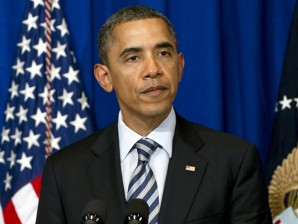HONOLULU — US President Barack Obama lands in Washington after his Hawaiian vacation Tuesday, facing a buzz saw of Republican campaign attacks as his reelection bid enters an intense new phase.
The president was Monday leaving the idyllic beaches, sumptuous restaurants and golf courses of his native state just before voters in chilly Iowa cast a first judgment on his potential Republican foes in November’s election.
Throwing himself into the political fray, Obama plans to press home his narrative that a greed-laced economic system backed by Republicans is stacked against most Americans and deprives them of a “fair shot,” officials said.
He will also run hard against an unpopular Congress and bypass the Washington echo chamber by making his case directly to voters in a vigorous travel schedule.
Obama will make his most significant foray yet into the campaign by addressing Iowa Democrats by streaming video Tuesday night as caucusing Republicans cast votes for their presidential nominee.
The president is already in the crosshairs of fierce Republican attacks on his economic record, especially from Mitt Romney, the favorite to win the party nomination.
“This has been a failed presidency,” Romney complained in Iowa on Sunday, seeking to frame the election as a referendum on Obama’s inability to deliver a return to economic boom times.
Republicans want to drag Obama into the mire of the election debate to soften him up before November’s polls and are comparing his 2008 message of hope with America’s current economic gloom.
Obama’s prospects of winning the second term that all presidents crave are darkened by high unemployment and a fragile economic recovery.
Despite a recent bounce and a year-end political win over Republicans in a row over extending a payroll tax cut, Obama’s approval ratings are in dangerous territory below 50 percent.
Therefore, Obama knows that he cannot afford for the election to be the referendum that Romney is proposing.
So he is offering Americans a new vision, posing as a warrior for the middle class, a case he will make in his first domestic trip of 2012 on Wednesday in swing state Ohio.
“You are the ones who make me hopeful about 2012,” Obama told Americans in his weekly address on Saturday.
“We’ve got some difficult debates and tough fights to come. As I’ve said before, we are at a make or break moment for the middle class.”
Dan Shea, a political science professor at Allegheny College, Pennsylvania, argued that Obama was hostage to economic conditions.
“If you are an incumbent, the voters are going to be looking backwards with a retrospective assessment,” Shea said.
“If they do that, [Obama] knows he is in trouble, so he is turning this into a question of his vision or a Republican vision,” he said.
“For that to have any credibility, there has to be some momentum in the economy.”
The White House is cheered by signs the recovery is picking up. Unemployment has dipped to 8.6 percent and data suggests improving consumer sentiment.
But any slowdown could doom Obama and his campaign team will look anxiously across the Atlantic at a euro debt crisis which threatens to spill over into the US economy, but which Washington has little capacity to influence.
Obama’s first test will come over his demands on lawmakers to extend a payroll tax cut to cover all of 2012.
In a tense standoff, House Republicans agreed under pressure from Obama to extend the tax break for just two months at the 4.2 percent rather than 6.2 percent rate just before Christmas.
The issue will likely form a key plank of Obama’s State of the Union address on January 24, one of his final chances to promote his policies with a public megaphone before he locks horns with his Republican foe.
Aides say Obama will be liberated in 2012 and not as dependent on obstructive Republicans to make his case.
“A yearlong extension is essentially the last must-do item of business on the president’s congressional agenda,” said deputy White House press secretary Josh Earnest.
Obama will twin the payroll tax push with new regular initiatives on the economy labeled “We Can’t Wait,” designed to bypass Republican blocking tactics in Congress, aides said.
“One of the biggest problems that the president has with his base is the perception that he is ineffective due to a perceived lack of spirit to fight,” said Kareem Creighton, a professor at the University of North Carolina.
“[The payroll debate] “marks the first time that he has tried [to fight] and stuck with it which has won him points on substance and on style with the Democratic base and at least some independents.”
